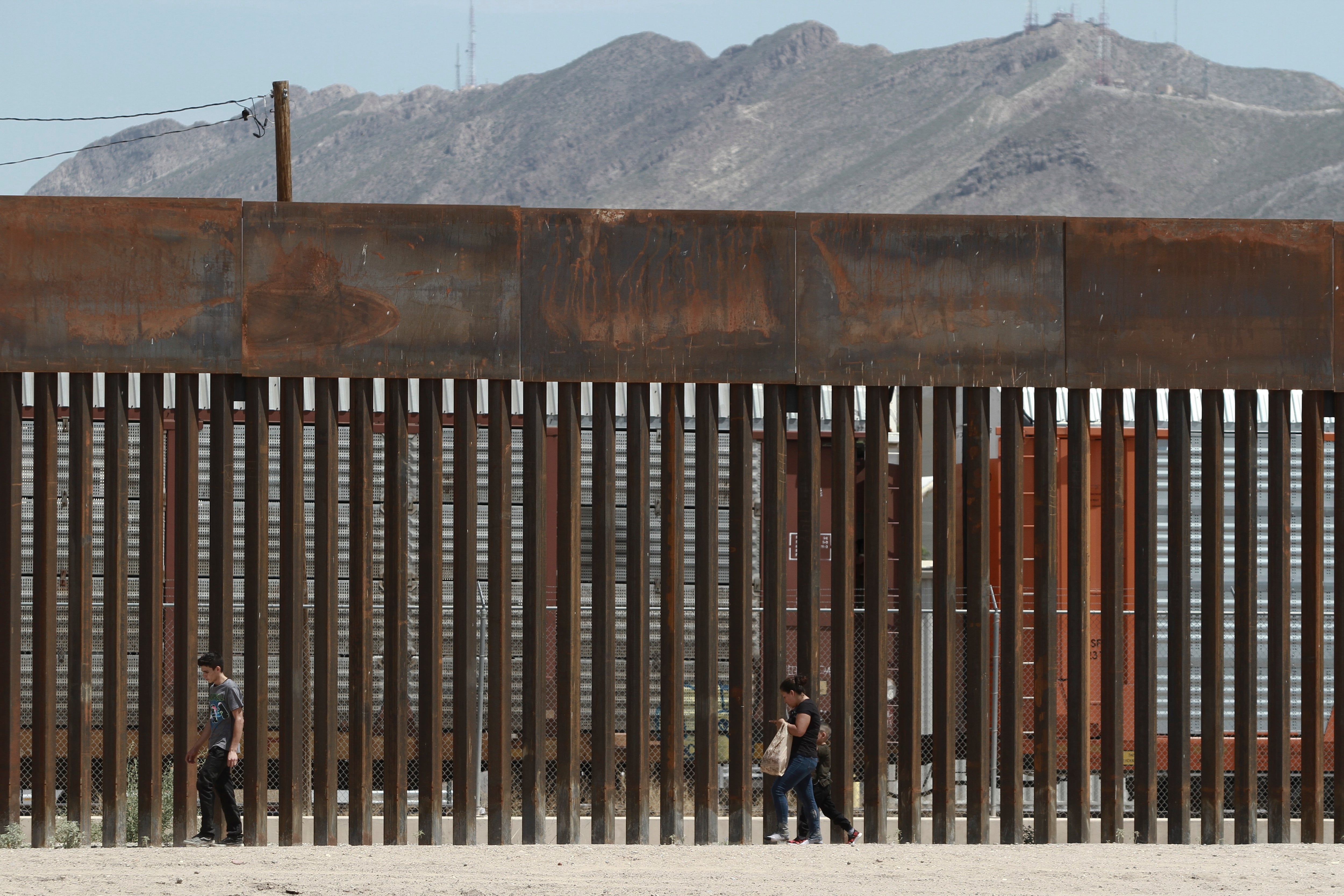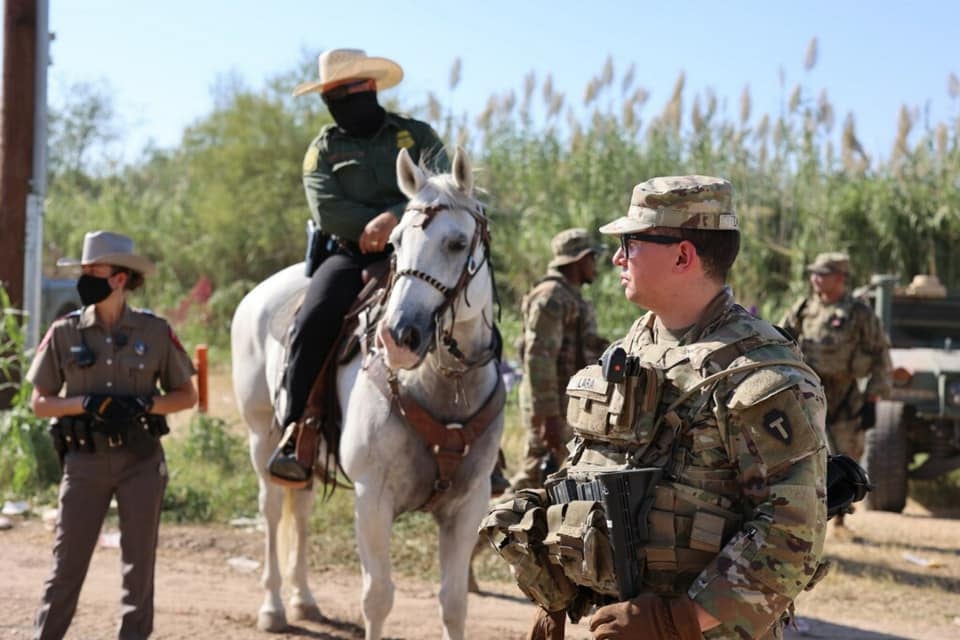The Texas National Guard is massively expanding its state active duty mission at the U.S.-Mexico border, with “thousands” of troops already there and “thousands more on the way” via unit-level involuntary mobilizations, Texas Military Department officials confirmed to Army Times.
Even as the border mission, dubbed Operation Lone Star, expands, Texas has slashed its tuition assistance budget by more than half — to roughly $1.4 million — to comply with a state-mandated budget reduction.
The benefit cut for soldiers comes after the Texas legislature provided a $300 million funding boost for the Texas Military Department’s border mission amid a record-high year for Border Patrol apprehensions.
Some critics of the mission have argued that the activations are a political ploy by Gov. Greg Abbott, who faces a primary challenge from former state Republican Party chair Allen West, a hardline conservative rival. West is a former Army officer who was forced to retire after he tortured a detainee while deployed to Iraq as a battalion commander in 2003.
Regardless of potential political motivations, though, the National Guard exists to execute lawful orders given through legitimate authority, explained Lt. Gen. Jon Jensen, the director of the Army National Guard, at a press conference earlier this month.
“What may be described as a political decision can also be described as a security decision, depending on where you sit on the issue,” Jensen said. “So what we look at is, whoever’s making the decision — are they making the decision within their authority, [and] is it a legal order?”
“If the answers to that are all yes, then obviously we need to go to the mission,” Jensen added. “We can’t get caught up on whether border security is a political issue or not.”
The mission’s rapid expansion
Operation Lone Star began in March, but it has entered a new phase in recent months as Abbott announced the state would begin arresting undocumented migrants who either slipped by or were released into the U.S. interior by federal immigration authorities.
To do that, the Texas Department of Public Safety entered into an agreement with more than 100 private landowners to press criminal trespass charges against migrants.
Critics argued to the Washington Post last month that the practice, especially when paired with increased penalties for trespassing, is overwhelming the local justice system and leaving undocumented migrants vulnerable to getting “lost in the system.”
Now, Texas has also given Guard troops unprecedented civilian arrest authority and joint patrol responsibilities on the border, according to comments made by Texas DPS director Steven McCraw to the Center for Immigration Studies. CIS is a conservative think-tank that advocates for strict border security; its critics, which include the Southern Poverty Law Center, have labeled it a hate group.

National Guard troops in a state active duty status — such as those assigned to Operation Lone Star — are considered state employees and are not subject to the Posse Comitatus Act, which restricts the use of the U.S. military for law enforcement.
But the troops’ duty status also means they are not accruing federal benefits like the G.I. Bill, and they will be ineligible for healthcare or disability benefits from the Veterans Administration for any injuries incurred during the mission.
To support the increased demand on Guard resources, the state has started involuntarily activating thousands more troops in recent weeks, state officials confirmed to Army Times.
“There are now thousands of Texas National Guard and Texas State Guard service members in the border region, with thousands more on the way,” said Maj. Martha Nigrelle, a Texas Military Department spokesperson.
Nigrelle declined to provide specific numbers, citing operational security.
“In the last two months, the need for our support to this mission has increased,” she explained. “Therefore, due to the operational needs and at the direction of the Governor, the number of service members assigned to this mission has also increased.”
Army Times spoke with soldiers on the border who said that in some cases, they had less than a week’s notice to settle their civilian affairs and report for border duty. The mission will last for months, the soldiers said, but it was not immediately clear how long the state intends to keep them at the border.
Nigrelle also noted that there is “nuance” to the involuntary activations, saying that “in some cases, interested service members are able to volunteer for certain missions, relieving others who have challenges meeting [their] service obligations.”

The newly-activated units tabbed for patrol duty are undergoing a week of condensed training meant to educate them on the use of deadly force and search and seizure rules, according to the CIS report.
It’s not clear how many troops have undergone the training, nor is it clear how many will participate in law enforcement.
Pay issues and a budget crunch
What is clear, though, is that many of the troops called up in recent weeks have yet to receive copies of their orders and have been experiencing significant pay issues.
One soldier, who spoke with Army Times on condition of anonymity because he was not authorized to speak publicly, said he was on mission for four weeks before he received his first paycheck Sunday.
Negrelle, the Texas Military Department spokesperson, said that the pay system, which was initially overwhelmed by the activations, has caught up.
“For the month of September, all personnel have either received their pay through direct deposit or should be in receipt of a physical check,” she explained. “Additional delays are not expected going forward.”
However, the troops called to state active duty can still expect much less in terms of state education benefits.
The National Guard’s state-specific tuition assistance benefits, which vary across the country, generally offset the majority of in-state tuition costs at state universities for qualifying Guard members.
The benefits are a major recruiting and retention tool that are commonly considered to be a necessary cost of doing business amid an era of increased state-specific missions for the Guard. A soldier tired of repeated state active duty call-ups can theoretically avoid them and continue to serve by transferring to the Army Reserve or Air Force Reserve, but state tuition benefits are an alluring reason for many to stick with the National Guard.
But the Texas National Guard, in its effort to comply with a legislature-mandated funding cut of five percent, has gutted its tuition assistance benefit to balance the books, according to budget documents available online and an email announcing the changes obtained by Army Times.
Before the cuts, the state offered $4,500 in reimbursement per semester to virtually all Texas Guard troops who were working full-time towards their first undergraduate degree or their first graduate or professional degree. That cost the state just over $3 million combined in fiscal 2020 and 2021, which pales in comparison to the $300 million that the Texas legislature authorized to fund Guard troops on the border in fiscal 2022 and 2023.
But for fiscal 2022 and 2023, the state tuition assistance budget has been slashed by 54 percent to just under $1.4 million, Nigrelle confirmed.

Retired Master Sgt. Manuel Flores, the state tuition assistance coordinator, announced the changes to the force in an Oct. 13 email. The sudden funding cut pulled the rug out from Texas Guard troops who may have been depending on the reimbursement — cutting the standard TA award to $1,000 and establishing a new priority list for who gets money and who doesn’t.
The state now only has the money to make $1,000 awards to 714 students against a total Texas National Guard end strength of more than 20,000 troops.
“The bottom line is that our budget has been dramatically cut for the next 2 years,” Flores said. “This change in budget requires us to adjust the method we use in assigning award amounts. As unpleasant as it is to change our methods after the school year has already begun, it is unfortunately unavoidable.”
As a result, he said, graduate students should expect to receive no state tuition assistance, and it’s “highly likely” that undergraduates will not receive more than $1,000. The maximum award is now $2,250.
The Texas Military Department itself requested the cuts, according to a legislative budget request available online. And in the department’s list of unfunded priorities for the legislature to consider funding above the budget request, restoring the tuition assistance budget came in sixth place, behind such pressing requirements as establishing a state parachute team.
“We will continue to assess and advocate for important benefit programs, like State Military Tuition Assistance, as we prepare requests for the next legislative session,” said Nigrelle. “Decisions made concerning legislative appropriations are outside the purview of this agency.”
But some students involuntarily activated for Operation Lone Star say that the state’s words wont pay their tuition bills.
“Cutting my TA by half probably means I’m gonna have to take some private loans to pay for school,” said one soldier who had to withdraw from his fall semester courses due to the activation. “Fuck this.”
Davis Winkie covers the Army for Military Times. He studied history at Vanderbilt and UNC-Chapel Hill, and served five years in the Army Guard. His investigations earned the Society of Professional Journalists' 2023 Sunshine Award and consecutive Military Reporters and Editors honors, among others. Davis was also a 2022 Livingston Awards finalist.





